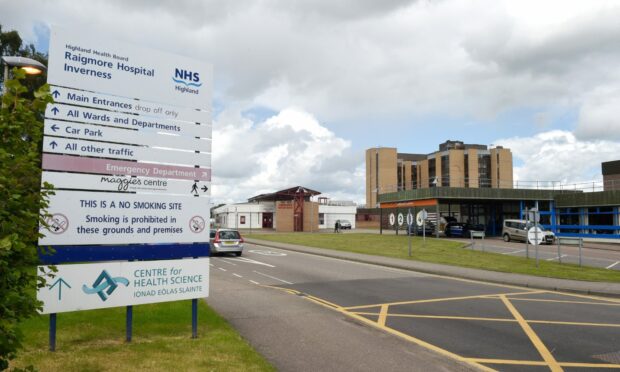NHS Highland has been fined £180,000 after a pensioner died of multiple falls while being treated at Raigmore Hospital.
Colin Lloyd, 78, had been identified as being at high risk of falling and in need of one-to-one care when he was admitted to Raigmore following a fall at home.
However, despite repeated requests for additional nursing staff none were made available and Mr Lloyd died of head injuries following a series of falls on the ward.
At a previous hearing, NHS Highland admitted a single health and safety breach in relation to Mr Lloyd’s death in February 2019.
Fiscal depute Trina Sinclair previously told the court that Mr Lloyd had been taken to Raigmore Hospital on February 6 2019 following a suspected fall at home.
On admission to ward 6A he was assessed as being a mobile patient who was at a “high risk” of further falls and bed rails were also deemed unsuitable, so he was classed as a patient that required one-to-one care from nurses.
“Mr Lloyd was not given one-to-one care, ” Ms Sinclair said, adding: “At 11.20pm on February 6 he rolled out of bed and hit his head.”
Cause of death was given as ‘recurrent falls’
The patient was found “lying on the floor with blood from a new laceration on his forehead”.
The following day the charge nurse reviewed staffing and made a request for a bank nurse to be brought in to meet the need for one-to-one care.
“The bank request was not fulfilled on the 7th or 8th of February,” Ms Sinclair told the court.
Mr Lloyd had a “near miss” incident on February 8 and two further falls on February 12 and 14.
He died on the ward on February 16 and the primary cause of death was given as “recurrent falls causing large left subdural haematoma”.
When the case called for sentencing at Inverness Sheriff Court today, Sheriff Robert Frazer recorded his condolences to Mr Lloyd’s family and those who knew him.
‘Clear red flags and failures in the level of care’
The sheriff noted that the hospital had responded to the “tragic death” with a series of measures to prevent reoccurrence.
He said that included a full-scale review of internal systems and patient procedures, the introduction of early-morning patient safety huddles involving senior management and staff to identify particular patient needs and a new electronic rostering system to record and track patient and staffing levels.
The court heard that there had been “clear red flags and failures in the level of care” which contributed to Mr Lloyd’s death, but Sheriff Frazer said there were “no deliberate breaches or failures so far short of the necessary standards to place this in the high or very high categories of culpability”.
The sheriff highlighted that the Highland Health Board had a budget of just under £1 billion, all of which is already accounted for.
As he fined the health authority £180,000, Sheriff Frazer said: “Since 2021, pressures, both financial and in terms of levels of treatment, have grown and not decreased on the NHS which is entirely state-funded.
“Any financial penalty will inevitably impact on the board’s budget and how it is utilised.”
Speaking after the sentencing, Debbie Carroll, who leads on health and safety investigations for the Crown Office and Procurator Fiscal Service (COPFS), said: “The tragic death of Colin Lloyd could have been prevented had suitable and sufficient measures been put in place.
“Highland Health Board failed to have effective arrangements and control measures were in place to prevent or mitigate falls to patients identified as being at risk and as a result Colin Lloyd suffered fatal head trauma.
“This prosecution should remind duty holders that a failure to manage and implement effective measures can have fatal consequences and they will be held accountable for this failure.”
‘We are sorry’
NHS Highland’s director of people and culture Fiona Hogg, who is also the board’s lead executive for health and safety, said: “We are deeply sorry for the failures identified in our care that led to the death of a patient at Raigmore Hospital in 2019.
“We recognise the lasting hurt this will have caused to those who loved and cared for Mr Lloyd and we are sorry for letting them down.
“Our internal review following the incident identified several areas of improvement and as a result, we have made a number of changes to our systems and practice.
“This includes clearer, more responsive processes for escalating staff shortages, the introduction of volunteers to provide additional support and companionship for older people in the acute hospital setting, and enhanced training for staff caring for people who are at risk of falling.”
